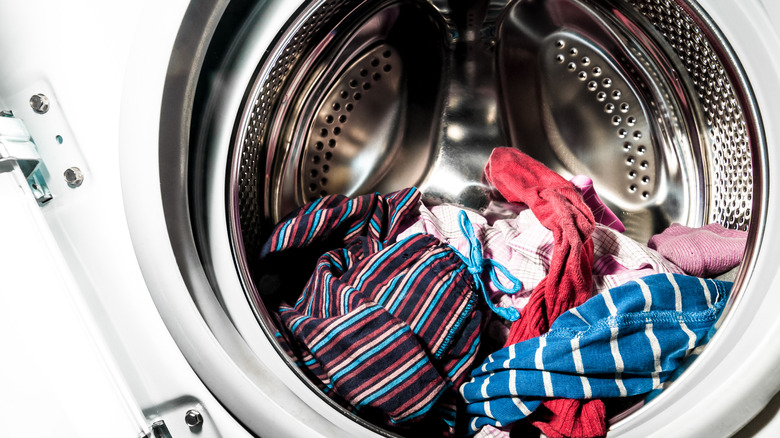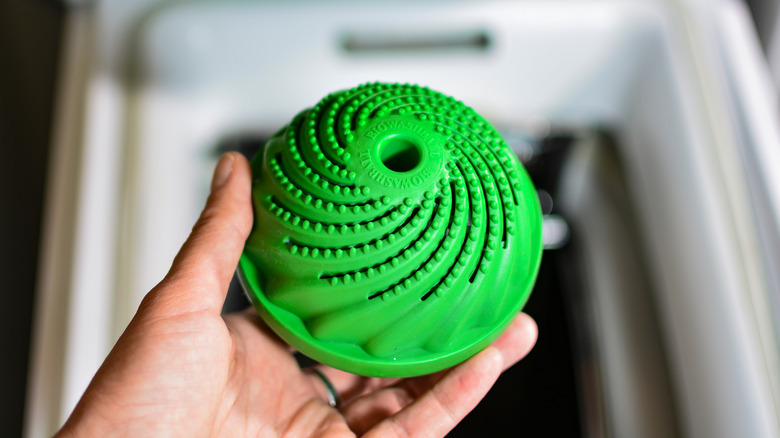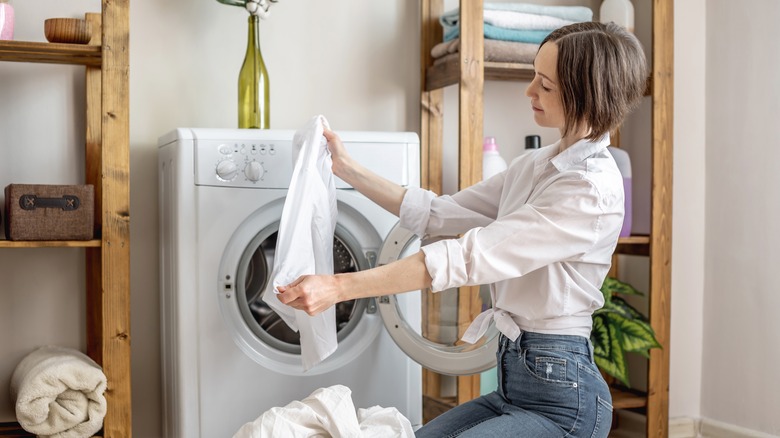This Affordable Laundry Find Is A Must-Have, According To Pinterest
We may receive a commission on purchases made from links.
Traditional laundry detergents contain harsh chemicals that may affect your skin, lungs, and overall health. A recent study published in the journal Allergy notes that these compounds can impair the epidermal barrier and cause skin inflammation. As a result, they may increase the odds of developing atopic diseases. Moreover, some chemicals in scented laundry detergent may contribute to cancer, allergies, reproductive problems, and organ damage. Given these aspects, it's no surprise that many consumers prefer natural cleaning products. One solution — provided by Pinterest user @asrochester87 – is to use laundry balls. These contain tiny bio-ceramic balls, pellets, or magnetic elements that can replace laundry detergent. For example, bio-ceramic and magnetic laundry balls are said to increase the water's pH level and kill germs.
Tap water has a pH of around 6.5 to 8.5, but this number may vary depending on where you live. In some areas, the water's pH is as low as 4.3. Most bacteria grow in an environment with a pH of 7 or less. So, assuming that laundry balls raise the water's pH by 0.6 or higher (as some manufacturers claim), they could indeed destroy the bacteria on clothes. However, this doesn't necessarily mean they can remove stubborn stains.
How do laundry balls work?
Laundry balls have been around since the early '90s, emerging as a more economical, eco-friendly alternative to detergents. However, their early versions had a higher price tag than those available today, with the average price being around $50 per set. But even so, they could be used over and over again, eliminating the need for laundry detergents and fabric conditioners. These products allegedly raise the water's pH, emit far-infrared rays, and create friction, removing dirt and germs from clothes during washing. Their exact mechanism of action depends on what the balls are made of. For example, these bio-ceramic laundry balls from Amazon are supposed to increase the pH of water to 6.9 to 9. However, you'll still need to pre-treat tough stains.
Washing balls contain none of the chemicals found in traditional detergents. Therefore, they're theoretically safer for your health and the environment. But despite being more sustainable than conventional cleaning products, they can increase the microfiber shedding of synthetic clothing and contribute to water pollution, according to 2022 research presented in the journal Sustainability. As the scientists noted, laundry balls create friction during the washing cycle, causing the release of microfibers. The effectiveness of laundry balls is subject to debate, too.
Laundry balls are good but not great
Back in 1999, the Federal Trade Commission (FTC) took action against two companies claiming that laundry balls were more effective than standard detergents due to their ability to magnetize the water or emit a negative charge. "At best, they're marginally better than washing clothes in hot water alone, and not as effective as washing them with laundry detergent," said Jodie Bernstein, the former director of the FTC's Bureau of Consumer Protection. "At worst, the products are completely useless," she added. There's no evidence that laundry balls emit far-infrared rays or "restructure" the water. However, they create friction with the garments in your washing machine, which may help remove some of the dirt. It's like washing your clothes by hand — but without laundry soap or detergent. Simply put, there's nothing magic about these products.
On the positive side, laundry balls contain no chemicals and are unlikely to affect your health (though some models are covered in plastic and may cause allergic reactions). As far as their efficiency goes, they probably won't get those tough stains out of your clothes. We'd rather recommend them for washing sweaty t-shirts, socks, and other garments that need a quick refresh or have light stains. Plus, some laundry balls last for up to 1,500 washes, which could save you a few bucks on detergent — even if you only use them occasionally.


